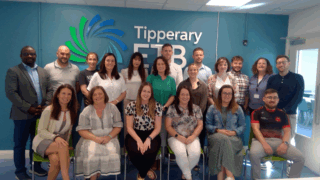Newport College, Newport, Co. Tipperary, has been awarded €5,000 as part of the Féilte Bursary Scheme to collaborate three schools, to support a Community of Practice for teaching and learning in English. This project aims to improve the teaching and learning in each school through highly effective collaboration, maximising potential through effective feedback and assessment strategies.
*List of collaborating schools:
- Borrisokane Community College
- Nenagh College
- Coláiste Phobail Ros Cré

School's reflection
- Teachers valued the opportunity to collaborate both with each other and other schools.
- Teachers found it beneficial to hear ‘high achievers’ voice on their learning and valuable to get their feedback.
- An online team for sharing resources between English teachers in different schools [would be beneficial].
- COP English meetings could be set up for English teachers that you could dip into as needed, depending on the topic.
- AI is posing challenges for English teachers – perhaps specific professional learning on AI specifically for English teachers would be beneficial.
- Time was a significant challenge for this project due to busy life of school and weather conditions.
Impact on students
During focus groups, students stated that they were happy to be included and appreciated having their voices heard. The analysed data suggests the following for students in relation to success criteria.
Enhancing Independent Learning
Both documents highlight that a significant proportion of students prefer working independently. Co-creating success criteria empowers students by allowing them to define what success looks like in their independent tasks, which aligns with their preferences and promotes ownership of their learning.
Incorporating feedback
The importance of teacher feedback is a recurring theme. By involving students in creating success criteria, teachers can clarify expectations and provide more focused and actionable feedback that resonates with the criteria students helped establish.
Addressing challenge levels
The data indicates that students feel ‘a little bit challenged’ but not enough to reach their full potential. Co-creating success criteria encourages students to set challenging yet achievable goals that push them beyond their comfort zones while maintaining a sense of control over their learning journey.
Motivation and engagement
Grades and self-motivation are primary motivators for students. When students are involved in defining their success criteria, they can create benchmarks that are personally meaningful, which can heighten motivation and investment in their work.
Students were surveyed at the end of the intervention on their understanding of ‘success criteria’. Key points from this survey showed:
Widespread understanding
All respondents indicated that they understand the term ‘success criteria’.
Definitions provided
Success criteria was commonly described as:
- A checklist or set of guidelines to ensure task completion
- Specific goals or standards to achieve full marks or meet requirements
- A way to measure what students should know or accomplish by the end of a task or lesson.
Common themes in definitions
- Focus on achieving standards (e.g. ‘full marks’, ‘successful completion’)
- Emphasis on understanding requirements and goals for better task execution
- Use of success criteria as a tool to align efforts and outcomes.